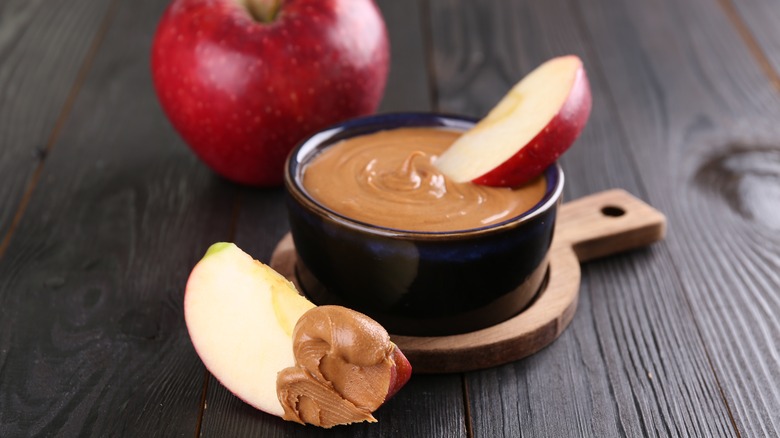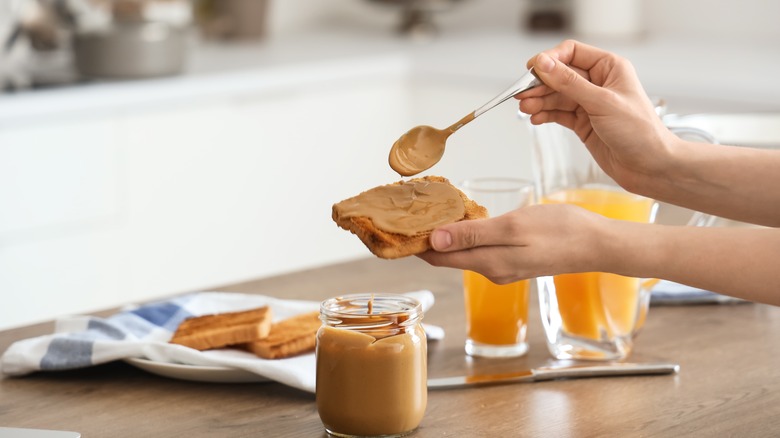What Happens To Your Body When You Eat 1 Cup Of Peanut Butter All At Once
Peanut butter can be a part of any meal. You can stir a little peanut butter into your morning oatmeal, or spread some peanut butter and its close friend jelly on two pieces of bread for lunch. Peanut butter also adds richness to your satays and curries, and a spoonful of peanut butter adds a little more protein to a post-workout smoothie.
Some of the high-fat, low-carb diets like keto might see a cup of peanut butter as keto-friendly, especially since just 14% of its calories come from carbs. However, too much fat at once can be disruptive to your digestive system, according to Orlando Health. You might find yourself bloated and gassy as a result. Overwhelming your body with a ton of dietary fat can also make your poop a little loose because your colon produces more liquid.
Just like any high-fat meal might entice you to take a nap, eating way too much peanut butter in a single sitting will have your body directing its energy towards digesting this fat. That means you could feel zapped in your energy.
The nutrients in a cup of peanut butter
Peanut butter is a nutrient-dense food, which means a lot of nutrition and calories in a small serving. For whatever reason, if you decide to eat a cup of peanut butter at once, your body will need to process a lot of nutrients in a single serving. One cup of peanut butter has 1,520 calories and 129 grams of fat. That means 76% of the calories come from fat.
What might be troublesome for your body when you eat too much peanut butter is that the 20 grams of saturated fat in a cup of peanut butter can increase your LDL cholesterol. The American Heart Association recommends no more than 13 grams of saturated fat per day for a 2,000-calorie diet to lower your cholesterol. A whole cup of peanut butter still has zero cholesterol and only 44 milligrams of sodium.
However, you'll also get 60 grams of monounsaturated fats, mostly in the form of oleic acid. Oleic acid is the main fatty acid found in olive oil that can reduce inflammation and lower cholesterol. A cup of peanut butter has 36 grams of the polyunsaturated fatty acid octadecadienoic acid, which is also anti-inflammatory.
Peanut butter can improve your health
Although eating a cup of peanut butter at once might not be good for your digestive system, eating a little bit of peanut butter every day can be good for you. Two tablespoons of peanut butter have 238 milligrams of potassium to help reduce your blood pressure, particularly since peanut butter is low in sodium (provided you choose the all-natural kind). Peanut butter is also a good source of magnesium to improve your exercise performance, bone health, and sleep.
Aside from peanut butter's vitamins and minerals, the polyphenols and saturated fatty acids can improve your mental health. A 2021 study in Clinical Nutrition had young adults eat either 25 grams of skin-roasted peanuts, 32 grams (2 tablespoons) of peanut butter, or 32 grams of a peanut oil-based control butter without peanut butter's phenolic compounds. After six months, the people eating peanut butter or peanuts had improved their memory and reduced their cortisol levels. All groups saw lower scores on depression. The researchers believe that the combination of polyphenols and saturated fatty acids improved memory. Certain fatty acids produced by the gut bacteria were linked to lower stress and depression scores.


